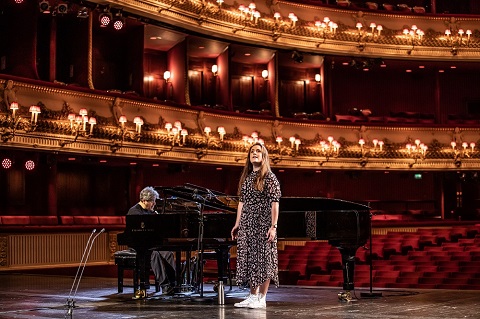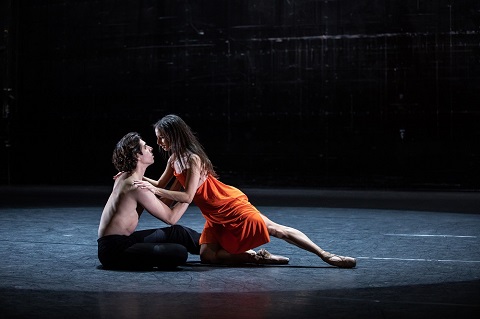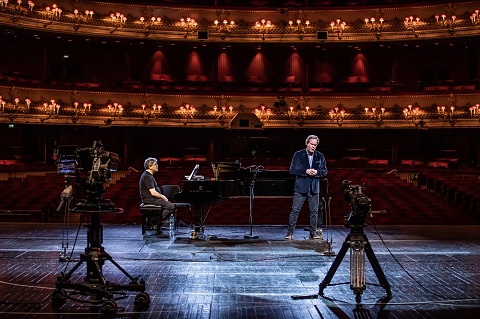
15 Jun 2020
From Our House to Your House: live from the Royal Opera House
I’m not ashamed to confess that I watched this live performance, streamed from the stage of the Royal Opera House, with a tear in my eye.
English Touring Opera are delighted to announce a season of lyric monodramas to tour nationally from October to December. The season features music for solo singer and piano by Argento, Britten, Tippett and Shostakovich with a bold and inventive approach to making opera during social distancing.
This tenth of ten Live from London concerts was in fact a recorded live performance from California. It was no less enjoyable for that, and it was also uplifting to learn that this wasn’t in fact the ‘last’ LfL event that we will be able to enjoy, courtesy of VOCES8 and their fellow vocal ensembles (more below …).
Ever since Wigmore Hall announced their superb series of autumn concerts, all streamed live and available free of charge, I’d been looking forward to this song recital by Ian Bostridge and Imogen Cooper.
The Sixteen continues its exploration of Henry Purcell’s Welcome Songs for Charles II. As with Robert King’s pioneering Purcell series begun over thirty years ago for Hyperion, Harry Christophers is recording two Welcome Songs per disc.
Although Stile Antico’s programme article for their Live from London recital introduced their selection from the many treasures of the English Renaissance in the context of the theological debates and upheavals of the Tudor and Elizabethan years, their performance was more evocative of private chamber music than of public liturgy.
In February this year, Albanian soprano Ermonela Jaho made a highly lauded debut recital at Wigmore Hall - a concert which both celebrated Opera Rara’s 50th anniversary and honoured the career of the Italian soprano Rosina Storchio (1872-1945), the star of verismo who created the title roles in Leoncavallo’s La bohème and Zazà, Mascagni’s Lodoletta and Puccini’s Madama Butterfly.
Evidently, face masks don’t stifle appreciative “Bravo!”s. And, reducing audience numbers doesn’t lower the volume of such acclamations. For, the audience at Wigmore Hall gave soprano Elizabeth Llewellyn and pianist Simon Lepper a greatly deserved warm reception and hearty response following this lunchtime recital of late-Romantic song.
Collapsology. Or, perhaps we should use the French word ‘Collapsologie’ because this is a transdisciplinary idea pretty much advocated by a series of French theorists - and apparently, mostly French theorists. It in essence focuses on the imminent collapse of modern society and all its layers - a series of escalating crises on a global scale: environmental, economic, geopolitical, governmental; the list is extensive.
For this week’s Live from London vocal recital we moved from the home of VOCES8, St Anne and St Agnes in the City of London, to Kings Place, where The Sixteen - who have been associate artists at the venue for some time - presented a programme of music and words bound together by the theme of ‘reflection’.
'Such is your divine Disposation that both you excellently understand, and royally entertaine the Exercise of Musicke.’
Amongst an avalanche of new Mahler recordings appearing at the moment (Das Lied von der Erde seems to be the most favoured, with three) this 1991 Mahler Second from the 2nd Kassel MahlerFest is one of the more interesting releases.
‘And there was war in heaven: Michael and his angels fought against the dragon; and the dragon fought and his angels, And prevailed not; neither was their place found any more in heaven … that old serpent … Satan, which deceiveth the whole world: he was cast out into the earth, and his angels were cast out with him.’
If there is one myth, it seems believed by some people today, that probably needs shattering it is that post-war recordings or performances of Wagner operas were always of exceptional quality. This 1949 Hamburg Tristan und Isolde is one of those recordings - though quite who is to blame for its many problems takes quite some unearthing.
There was never any doubt that the fifth of the twelve Met Stars Live in Concert broadcasts was going to be a palpably intense and vivid event, as well as a musically stunning and theatrically enervating experience.
‘Love’ was the theme for this Live from London performance by Apollo5. Given the complexity and diversity of that human emotion, and Apollo5’s reputation for versatility and diverse repertoire, ranging from Renaissance choral music to jazz, from contemporary classical works to popular song, it was no surprise that their programme spanned 500 years and several musical styles.
The Academy of St Martin in the Fields have titled their autumn series of eight concerts - which are taking place at 5pm and 7.30pm on two Saturdays each month at their home venue in Trafalgar Square, and being filmed for streaming the following Thursday - ‘re:connect’.
The London Symphony Orchestra opened their Autumn 2020 season with a homage to Oliver Knussen, who died at the age of 66 in July 2018. The programme traced a national musical lineage through the twentieth century, from Britten to Knussen, on to Mark-Anthony Turnage, and entwining the LSO and Rattle too.
With the Live from London digital vocal festival entering the second half of the series, the festival’s host, VOCES8, returned to their home at St Annes and St Agnes in the City of London to present a sequence of ‘Choral Dances’ - vocal music inspired by dance, embracing diverse genres from the Renaissance madrigal to swing jazz.
Just a few unison string wriggles from the opening of Mozart’s overture to Le nozze di Figaro are enough to make any opera-lover perch on the edge of their seat, in excited anticipation of the drama in music to come, so there could be no other curtain-raiser for this Gala Concert at the Royal Opera House, the latest instalment from ‘their House’ to ‘our houses’.
"Before the ending of the day, creator of all things, we pray that, with your accustomed mercy, you may watch over us."

I’m not ashamed to confess that I watched this live performance, streamed from the stage of the Royal Opera House, with a tear in my eye.
Co-curated and introduced by Music Director, Antonio Pappano, seated at the Steinway positioned front-of-stage, it was the first of three such live streams from the House and the first live performance at Covent Garden since the curtain went down and the doors were closed on 17th March.
At least the performers, facing upstage, were spared the emptiness that confronted the viewers: a twilight auditorium of gently glowing crimson and gilt, the two thousand-plus empty seats a reminder, if any were needed, of the prevailing sense of loss that shadows the entire world at this present time.
If the audience at home were anticipating an uplifting medley of their opera favourites, then they would have been disappointed, at least until the final minutes of this seventy-minute broadcast. Instead, Pappano has devised a programme which might have been titled ‘A Celebration of British Twentieth-Century Song’. It was an ingenuous sequence which opened with a heralding fanfare and ranged through celebration and sombreness, dramatic immediacy and wistful reflection, extrovert humour and intimate longing. The sung items framed a sinuous, tactile dance newly choreographed by Wayne McGregor, since 2006 the Resident Choreographer at the House, to Richard Strauss’s ‘Morgen’, the composer’s wedding present to his lifelong companion and muse, Pauline de Ahna.
A Handelian flourish of confidence got things underway, Pappano’s crystalline arpeggios rippling down the keyboard with glittering panache at the start of Britten’s ‘Let the Florid Music Praise’, the opening song of his 1937 cycle On This Island, setting five poems by W.H. Auden. The first performance of the work took place at London’s Broadcasting House, sung by Sophie Weiss with Britten himself at the piano. Here, Pappano was joined by Louise Alder whose last live performance was probably on a stage the other side of the West End, as Susanna in ENO’s new production of The Marriage of Figaro, which was forced to closed its doors after the opening night.
Alder’s soprano gleamed, rising rejoicingly through the ascending fanfares, as she and Pappano pushed forward with optimism, the pinpoint-accurate bravura hastening towards the climatic “Shine on!”, before the piano’s beautifully tailored transition led into the more muted strains of the Purcellian minor-key reflections on loss and death. Britten’s chromatic vocal curls are as complex as Auden’s elusive imagery, both melodic line and text presenting real challenges to the singer, but Alder beautifully captured the veiled intimation and privacy, Pappano’s accompaniment ever discreet. Her vocal agility was impressive in ‘Now the leaves are falling fast’, though perhaps the tempo was a little too impetuous as the text was somewhat lost amid the racing vocal undulations.
The surfeit of detail in ‘Seascape’ was brilliantly negotiated by Pappano, as Alder combined vocal sweetness with flexibility and perceptive textual interpretation. The highlight was the ‘Nocturne’, its very simplicity ensuring its intensity. Alder’s phrasing and breath control - wonderfully sustained diminuendos and finely crafted phrase-endings, so often neglected - were consummate. After the rapture, a perky conclusion, ‘As it is, plenty’ reminding us of the jazzy spirit of Britten’s ‘Cabaret Songs’.
 Louise Alder and Antonio Pappano in rehearsal at the Royal Opera House. Photo credit: Lara Cappelli.
Louise Alder and Antonio Pappano in rehearsal at the Royal Opera House. Photo credit: Lara Cappelli.
Butterworth’s A Shropshire Lad seems to be proving a favourite among tenors and baritones during these troubling months, and here it was tenor Toby Spence who followed Alder onto the ROH stage, to sing of loss and longing, but also of regeneration and hope. ‘Loveliest of trees’ was delicate and restrained, both Pappano and Spence lingering for the tiniest of moments at the start of their first phrases, then moving forward with eloquence and composure, Spence enunciating the text with scrupulous care, Pappano subtly pointing the harmonic nuances which are more complex than the folk-like clarity of the vocal line sometimes leads us to assume. The poet’s longing for a simpler time was incredibly moving. Spence was a resonant ‘wise man’ in ‘When I was one-and-twenty’ and the subtle fading into the final doleful acknowledgement that the heart is never given in vain, but “sold for endless rue”, was brilliantly done.
‘Look not in my eyes’ had a lovely narrative fluency, the 5/4 tempo rolling easily onwards, Spence’s middle register warm and even. The same unmannered gentleness infused ‘The lads in their hundreds’: sad but pragmatic, the tempo relaxed and the mood never sentimental, this was a masterclass in ‘less is more’. Spence closed his eyes to inhabit the distant, departed speaker in ‘Is my team ploughing’, the soft questions rudely disrupted by a voice ardent and strong, but offering re-assurance - “be still … lie down and sleep” - then dismissing the troubling past, “I cheer a dead man’s sweetheart, never ask me whose”. The piano seemed almost to plunge into the grave at the close.
McGregor’s deeply sensitive and intimate interpretation of Strauss’s ‘Morgen!’ followed, danced by two of the Royal Ballet’s Principals, Francesca Hayward and Cesar Corrales. A ‘real-life’ couple, Hayward and Corrales entwined with breath-taking tenderness and intensity, Corrales curving, arching, bending with astonishing smoothness, like an inky line trailing through water, Hayward as graceful as soft silk blowing in the breeze. McGregor emphasised the electricity of human touch and the human body’s engagement with space and air. As Alder and the violinist Vasko Vassilev, the Concert Master of the Orchestra of the Royal Opera House, caressed Strauss’s floating images of the ‘sun-breathing earth’, ‘beach, wide, wave-blue’, the dancers slowly sank into ‘the mute silence of happiness’.
 Cesar Corrales and Francesca Hayward. Photo credit: Lara Cappelli.
Cesar Corrales and Francesca Hayward. Photo credit: Lara Cappelli.
Next it was the turn of Gerald Finley, who began with Mark Anthony Turnage’s Three Songs (2000), written especially for the Canadian baritone, who created the role of Harry Heagan in Turnage’s opera The Silver Tassie. During rehearsals for that first production Finley asked Turnage if he would contribute something new to a recital programme that he was building around Ravel’s Histoires Naturelles , lively musical portraits of the animal kingdom. Turnage obliged, and the result was this set of three songs, two about cats (setting Stevie Smith’s ‘The Singing Cat’ and Thomas Hardy’s ‘Mourning’) which are followed by Walt Whitman’s ‘Last Words’ from Leaves of Grass in which the poet dreams of a life lived with and amid animals.
Turnage’s word-setting is Brittenesque, and both the verbal rhythm and the relationship between voice and piano reflects what Britten learned from Purcell. If the songs seem rather erudite and distanced, then Finley’s clarity of diction and vocal focus drew the listener in. Hardy’s sober reflections were particularly telling, as Finley stretched through the poetic lines, and revelled in the dark colours, “Till your way you chose to wend/ Yonder, to your tragic end”. His easeful crossing of wide vocal registers ensured an integration of feeling and means of communication. And, he gave us a warming, somewhat wry, smile at the close of the Whitman setting, “I think I could turn and live with animals”.
Finley demonstrated the extraordinary range of moods, emotions, colours that he can encompass in his final two solo items. Britten’s ‘The Crocodile’ (1941) ratchets up its tweeness via a series of clichéd rising modulations which here suggested that Finley could have made a fine living in the nineteenth century from musical reviews and seaside shows - though never once was the elegance of the textual delivery and vocal mellifluousness marred. The dirge from Act 4 of Shakespeare’s Cymbeline, ‘Fear no more the heat o’ th’ sun’, is more sombre and complex, and the setting by Gerald Finzi (whether it is to be sung or spoken in its theatrical context is a matter of ongoing debate) seems somehow to speak to the ‘English’ spirit: is it the hymn-like quality of the modal harmony, the folk resonances, the walking bass, spiritually redolent plagal cadences, the very measured way in which deep emotions are communicated? Who knows, but Finley ensured we appreciated Finzi’s wonderful word-setting, through the innate logic of his phrasing within the largely strophic structure. I have long been of the view that, yes, Finzi does always sound ‘like Finzi’, but that anything by Finzi is worth hearing - and Finley confirmed this here.
 Gerald Finley and Antonio Pappano in rehearsal at the Royal Opera House. Photo credit: Lara Cappelli.
Gerald Finley and Antonio Pappano in rehearsal at the Royal Opera House. Photo credit: Lara Cappelli.
And so, we swept on to the opera. First, a dazzling ‘Tornami a vagheggiar’ from Louise Alder who made Morgana (Alcina) seem surprisingly human in her desires and compulsions, despite being infatuated by one who is not what he seems. The B section of the da capo offered a beautiful contrast of legato phrasing and deep sentiment, in opposition with the coquettishness wizardry of the opening, in which the ornaments were brilliantly (in every sense of the word) executed.
To close, Bizet: the final duet for Nadir and Zurga, ‘Au fond du temple saint’, from Les Pêcheurs de perles was a flowering of operatic melodising. Pappano conjured every symphonic colour that could be wrought from the Steinway and the voices of Spence and Finley blended beautifully. Okay, one had to imagine much - the theatrical context, the orchestral plushness, the emotional heightening, fullness and richness - but the shared vision of beauty and grace hit the heart hard.
And, so, what of the wider picture? Well, it was left to Wayne McGregor to note the crippling and threatening challenges faced by arts institutions of all kinds and sizes across the UK, and especially the plight of tens of thousands of freelancers who are not eligible for government support. And, in support of the Black Lives Matter movement, all involved took the knee after McGregor’s new pas de deux.
But, the darkened auditorium that cast its shadow over the broadcast spoke louder than words and actions of this kind. Performers need to perform, and they need to perform to audiences: digital audiences are some recompense, but they are no substitute for the sort of inter-personal and inter-musical relationships that develop during a live performance.
This was the first of three live concerts from the Royal Opera House: it was free-to-view and is available via the ROH’s YouTube, Facebook and Vimeo channels until 27th June. There will be two further concerts on 20th and 27th June, available at a cost of £4.99. The programme on 20th June will comprise a performance of Albert Schonberg’s reduction of Gustav Mahler’s Das Lied von der Erde with tenor David Butt Philip, mezzo-soprano Sarah Connolly, and soloists of the Orchestra of the Royal Opera House and a performance of the ‘Dance of the Blessed Spirits’ from Gluck’s Orfeo ed Euridice, featuring principal dancer Vadim Muntagirov.
Claire Seymour
Louise Alder (soprano), Toby Spence (tenor), Gerald Finley (baritone), Antonio Pappano (piano), Vasko Vassilev (violin), Francesca Hayward (dancer), Cesar Corrales (dancer)
Benjamin Britten - On this Island Op.11; George Butterworth -Six Songs from A Shropshire Lad; Ballet Interlude - New pas de deux, choreographed by Wayne McGregor to Richard Strauss’ ‘Morgen!’ Op.27 No.4; Mark-Anthony Turnage - Three Songs; arr. Benjamin Britten: ‘The Crocodile’; Gerald Finzi - ‘Fear No More the Heat o’ the Sun’ Op.18 No.3; George Frideric Handel - ‘Tornami a vagheggiar’ (Alcina); Georges Bizet - ‘Au fond du temple saint’ ( Les Pêcheurs de perles)
Royal Opera House, Covent Garden, London; Saturday 13th June 2020.